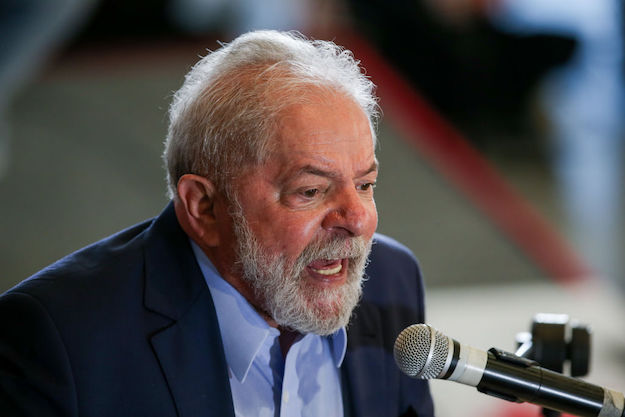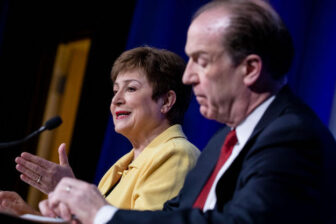SÃO PAULO – When former president Luiz Inácio Lula da Silva made his much-awaited first speech as a de facto 2022 candidate last week, he cleverly projected himself as the exact opposite of Jair Bolsonaro: statesmanlike, centrist, pro-science and well-connected across the world. The former president also lambasted Bolsonaro’s mishandling of the pandemic, the economy and his controversial foreign policy, describing the former army captain as both divisive and incompetent.
Yet while Lula seemed to criticize every single one of Bolsonaro’s policies, one topic was conspicuously absent: During his nearly 90-minute speech, the left-wing leader did not once mention climate change, deforestation or fires in the Amazon forest and the Pantanal wetlands, all of which have made regular global headlines over the past several years.
Considering Bolsonaro’s anti-environmental stance is one of the major reasons for Brazil’s growing diplomatic isolation — and with it, potentially serious consequences for the economy — it was a remarkable omission. Lula could have easily scored points with environmentalists by criticizing Bolsonaro’s decision to weaken the country’s deforestation watchdog, Ibama, decrying the president’s decision to allow the suspension of Norwegian and German financial support to the multi-billion dollar Amazon Fund preservation scheme or ridiculing senior government members’ doubts about the existence of global warming.
Yet far from coincidental, the omission reflects a profound difference between the political landscapes in Europe and the United States on the one side — where the fight against climate change is a growing public concern and has been taken up by the majority of parties, particularly those on the center-left — and Latin America on the other, where environmentalists have struggled to reach high office. While “green leaders” such as Anne Hidalgo in France, Alexandria Ocasio-Cortez in the United States and Annalena Baerbock in Germany are thought to have bright political futures, Latin America, where more environmental activists are killed than anywhere in the world, offers a stark contrast.
Traditional left-wing parties across the region, in fact, have often been the subject of fierce criticism by environmentalists. Brazilian environmentalist icon Marina Silva quit her job as Environmental Minister under then-President Lula in 2008, protesting a lack of support for her agenda to protect the Amazon. Three years later, the Inter-American Court of Human Rights requested the suspension of the licensing process for Belo Monte, a controversial hydroelectric dam project in the North of Brazil, alleging native populations’ human rights had been violated. Then-President Dilma Rousseff not only rejected the decision, but also temporarily withdrew Brazil’s Ambassador to the Organization of American States (OAS).
Nor do political ideology and environmentalist credentials demonstrate a strong correlation elsewhere in the region. Environmentalists have frequently clashed with leftist leaders like Ecuador’s Rafael Correa, who cracked down on environmental activism during his presidency, and Bolivia’s Evo Morales, who opened up protected areas for extractive energy exploration and in 2019 oversaw a reign of forest fires nearly on par with those that torched the Brazilian Amazon that year. Mexico’s Andrés Manuel López Obrador has demonstrated a strong preference for fossil fuels and is actively thwarting the development of renewable energy in the country. In Venezuela, the Maduro government is concealing official data on the environment, and deforestation is thought to have worsened considerably over the past years, with illegal mining skyrocketing in parallel. Brazil’s Bolsonaro, for his part, rejects the science of climate change as a left-wing conspiracy. But some center-right leaders have taken the lead on the matter: It was Colombian President Iván Duque, for example, who pushed for the Leticia Pact to better coordinate the fight against deforestation in the Amazon.
Why have environmentalists not been more successful influencing center-left parties in Latin America? Four reasons come to mind.
The first is a persistent belief (across the ideological spectrum) that environmental protection places a drag on economic development, a misconception that weighs even more heavily in countries with commodity-dependent economies.
Second is a perception — one that holds significant weight among the armed forces in countries like Brazil — that environmentalism is a Trojan Horse meant to undermine countries’ sovereignty. This strand of thinking has been strengthened by the ongoing debate about whether “ecocide” should be considered an international crime, as well as international conjecturing about outside intervention in the Amazon (reactions to Steve Walt’s ponderings on the issue are emblematic). The idea is further aggravated by the fact that, while outside criticism vis-à-vis deforestation is legitimate, European and U.S. criticism of Latin America’s environmental policies is often hypocritical, and tends to overlook the region’s remarkably clean energy matrix — countries such as Uruguay and Costa Rica, for example, generate around 98% of all electricity from renewable sources.
Third, in countries like Brazil and Mexico, state-led oil firms such as Petrobras or Pemex are thought to strengthen state capacity and evoke national pride. Founded in 1938 and 1953, respectively, the two firms’ histories are intimately tied to their countries’ transformations from rural economies to the industrialized powerhouses they are today. Renewables, on the other hand, do not evoke the same imagery of development and geopolitical strength.
Finally, many left-wing parties in the region have suffered from a lack of new leadership. Establishment party members have tended to cling to conservative notions about development; newcomers, often touted as protégés of former presidents, find themselves constricted by their mentors. All but absent from the region are progressive leaders akin to Ocasio-Cortez or Baerbock, both of whom have shown themselves free to introduce new ideas into the public discourse.
A growing number of green senators and mayors, however, now points to the emergence of more progressive leadership in the fight against climate change. This includes figures like Bogotá Mayor Claudia López of the “Green Alliance” and Brazilian Senator Randolfe Rodrigues of the Sustainability Network. Notably, neither hail from their countries’ established left-wing parties.
At the presidential level, things continue to move more slowly. In Brazil, Marina Silva failed to reach the presidential run-offs in three consecutive elections starting in 2010. Ecuador’s Yaku Pérez, who sought to offer a left-wing environmentalist alternative to Rafael Correa protegé Andrés Arauz, fell short earlier this year. Potential remains for certain environmentalist candidates, however. Wins for Verónika Mendoza or Marco Arana in Peru this year, or Sergio Fajardo in Colombia next year, could strengthen similar candidacies across the region. Latin America’s major left-wing parties will surely take note.








